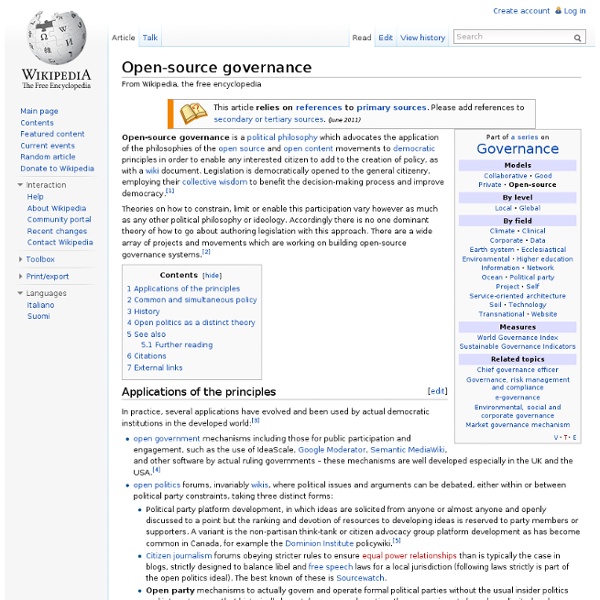Noocracy
Noocracy (/noʊˈɒkrəsi/ or /ˈnoʊ.əkrəsi/), or "aristocracy of the wise", as defined by Plato, is a social and political system that is "based on the priority of human mind", according to Vladimir Vernadsky.[citation needed] It was also further developed in the writings of Pierre Teilhard de Chardin.[citation needed] Etymology[edit] Development[edit] One of the first attempts to implement such a political system was perhaps Pythagoras' "city of the wise" that he planned to build in Italy together with his followers, the order of "mathematikoi." As defined by Plato, Noocracy is considered to be the future political system for the entire human race, replacing Democracy ("the authority of the crowd") and other forms of government. Publications[edit] In the European Commission Community Research publication, Art & Scientific Research are Free: Towards a Culture of Life, it states several commentaries by Hans Jonas and especially Ladislav Kovác about Noocracy.[1] See also[edit] References[edit]
Sociocracy
Sociocracy is a system of governance, using consent-based decision making among equivalent individuals and an organizational structure based on cybernetic principles.[1] The most recent implementation of sociocracy by Gerard Endenburg,[2] also known as Circular Organizing, was developed as a new tool for governance of private enterprise, but has been adopted in many different kinds of organizations including public, private, non-profit and community organizations as well as professional associations. Origins[edit] The word sociocracy is derived from the Latin and Greek words socius (companion) and kratein (to govern). It is English for the word sociocratie, coined in 1851 by Auguste Comte, a French positivist philosopher (who also derived the word sociology from social physics) and later used by the U.S. sociologist Lester Frank Ward in a paper he wrote for the Penn Monthly in 1881 and later still by Dutchman Kees Boeke, who applied the concept to education. Essential principles[edit]
Main Page - Metagovernment - Government of, by, and for all the people
Metasystem transition
A metasystem transition is the emergence, through evolution, of a higher level of organization or control. The concept of metasystem transition was introduced by the cybernetician Valentin Turchin in his 1970 book "The Phenomenon of Science", and developed among others by Francis Heylighen in the Principia Cybernetica Project. The related notion of evolutionary transition was proposed by the biologists John Maynard Smith and Eörs Szathmáry, in their 1995 book The Major Transitions in Evolution. Turchin has applied the concept of metasystem transition in the domain of computing, via the notion of metacompilation or supercompilation. Evolutionary Quanta[edit] The following is the classical sequence of metasystem transitions in the history of animal evolution according to Turchin, from the origin of animate life to sapient culture: See also[edit] References[edit]
Paradigm shift
A paradigm shift (or revolutionary science) is, according to Thomas Kuhn, in his influential book The Structure of Scientific Revolutions (1962), a change in the basic assumptions, or paradigms, within the ruling theory of science. It is in contrast to his idea of normal science. According to Kuhn, "A paradigm is what members of a scientific community, and they alone, share" (The Essential Tension, 1977). Unlike a normal scientist, Kuhn held, "a student in the humanities has constantly before him a number of competing and incommensurable solutions to these problems, solutions that he must ultimately examine for himself" (The Structure of Scientific Revolutions). Kuhnian paradigm shifts[edit] Kuhn used the duck-rabbit optical illusion to demonstrate the way in which a paradigm shift could cause one to see the same information in an entirely different way. Science and paradigm shift[edit] Examples of paradigm shifts[edit] Natural sciences[edit] Social sciences[edit] Marketing[edit] M.
Community engagement
This article is about grassroots community benefit efforts. For governmental community benefit efforts, see public engagement Community engagement refers to the process by which community benefit organizations and individuals build ongoing, permanent relationships for the purpose of applying a collective vision for the benefit of a community. While community organizing involves the process of building a grassroots movement involving communities, community engagement primarily deals with the practice of moving said communities towards change, usually from a stalled or otherwise similarly suspended position. Origins[edit] Community engagement can trace its roots to the concept of community benefit, a term that grew out of an English common law concept, articulated in an 1891 legal decision that defined four types of charitable organizations:trusts for the advancement of education; trusts for the advancement of religion; and trusts for other purposes beneficial to the community.[1]
Game theory
Game theory is the study of strategic decision making. Specifically, it is "the study of mathematical models of conflict and cooperation between intelligent rational decision-makers."[1] An alternative term suggested "as a more descriptive name for the discipline" is interactive decision theory.[2] Game theory is mainly used in economics, political science, and psychology, as well as logic, computer science, and biology. The subject first addressed zero-sum games, such that one person's gains exactly equal net losses of the other participant or participants. Modern game theory began with the idea regarding the existence of mixed-strategy equilibria in two-person zero-sum games and its proof by John von Neumann. This theory was developed extensively in the 1950s by many scholars. Representation of games[edit] Most cooperative games are presented in the characteristic function form, while the extensive and the normal forms are used to define noncooperative games. Extensive form[edit] [edit]



